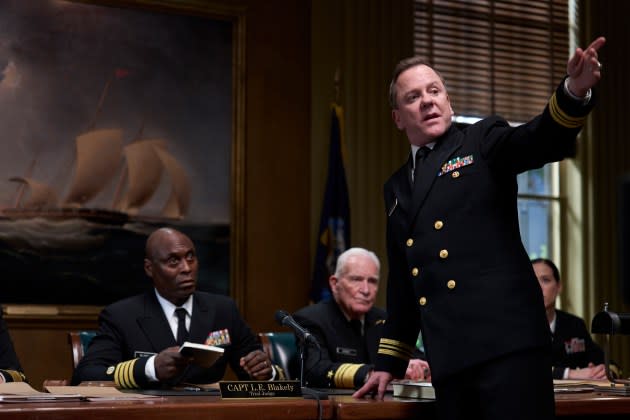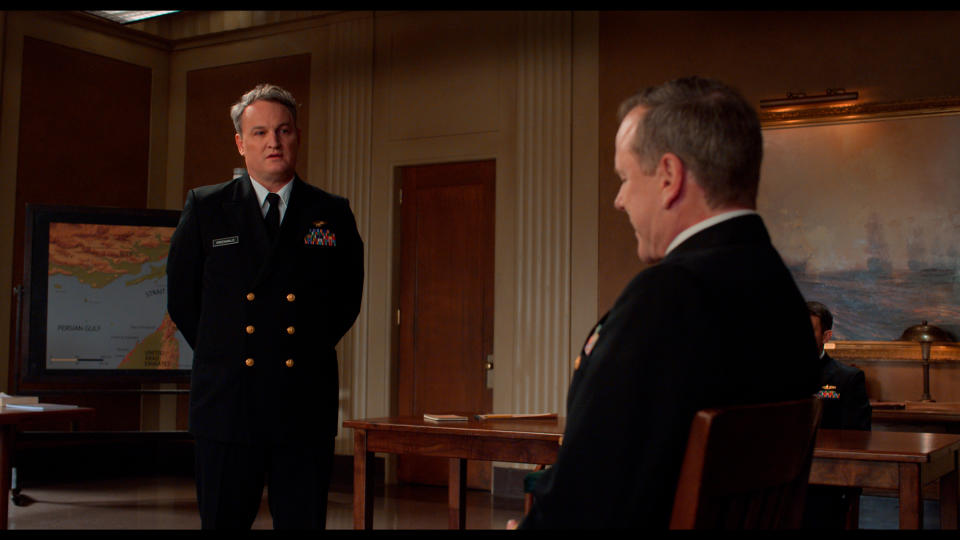‘The Caine Mutiny Court-Martial’ Is the Perfect Ending to William Friedkin’s Career

Long before he made Popeye Doyle race a Brooklyn subway and Regan MacNeil’s head spin, William Friedkin began his career doing live TV. He’d move on to an episode of The Alfred Hitchcock Hour, short documentaries, a Sonny-and-Cher joint (Good Times), theatrical adaptations (The Birthday Party, The Boys in the Band), and then an all-guts-all-glory double shot that instantly made him a New Hollywood power player. But like a lot of directors coming up in the early 1960s, his roots were with actors, words, conflict, and not much more. Give this bull a simple soundstage on which to rage, and Wild Billy could deliver a livewire jolt.
It’s why The Caine Mutiny Court-Martial — Friedkin’s first narrative feature since 2011’s Killer Joe and the last movie he completed before his death in August — feels like a final word, even if that wasn’t necessarily his intention behind making it. In an interview last year, the veteran filmmaker behind The French Connection, The Exorcist, Sorcerer, and To Live and Die in L.A. mentioned that Herman Wouk’s play (adapted from his own 1951 novel) had been on his mind a lot recently. He’d start shooting in January of this year and had it ready to premiere at the Venice Film Festival, which would end up screening it a few weeks after his passing. Though Friedkin mentioned he thought a take on Wouk’s story “could be a very timely… piece,” it’s hard to find anything in this purposefully stagy courtroom drama that’d feel out of place had he made it right when he was starting out in the business. There are no car chases, no head-spinning demon children, no game-winning dunks from Shaq. There aren’t even cellphones. Just performers digging into well-worn material about speaking truth to power, as a legendary filmmaker comes full circle. And it’s fucking electric.
More from Rolling Stone
Big Suits, Lost Tapes, and Dancing Heads: Inside A24's Incredible 'Stop Making Sense' Restoration
'Superpower' Is Sean Penn's Odd Vanity Project About Zelensky
You can see why Friedkin might be interested in telling a tale about standing up to bad leaders at this particular juncture in American history. Still, using Wouk’s story about a court-martial trial involving a (fictional) naval uprising and a mad-hatter captain as a starting point, he gives us a fairly by-the-book and subtext-free interpretation of military justice being played out in a court of law. Sitting in the judge’s seat is Captain Luther Blakely (Lance Reddick, in his final role). On the prosecutorial side: Officer Katherine Challee (Monica Raymund) is charging that Lieutenant Stephen Maryk (Jake Lacy) committed mutiny when he took command of the U.S.S. Caine during a cyclone. On the defense’s side: Lieutenant Barney Greenwald (Jason Clarke), who’s claiming that Maryk shouldn’t be thrown in the brig because the man at the helm of the ship had lost his marbles, and thus was endangering the lives of the entire crew.
That so-called lunatic would be Captain Queeg, a role that Humphrey Bogart made famous by playing up the paranoia, the nervous tics, and the boiling-kettle anger that leads to a full-steam-ahead breakdown. You probably know about his Queeg muttering about strawberries, even if you haven’t seen Edward Dmytryk’s 1954 movie. In Robert Altman’s 1988 made-for-cable version, Brad Davis — best known for playing the heroin-smuggling prisoner in Midnight Express — chewed slightly less scenery with the part. Here, Friedkin casts Kiefer Sutherland as the ship captain prone to holding three-day-long interrogations over missing fruit, imaginary duplicate keys, and broken coffee-makers.
Wisely, the 24 star doesn’t try to out-rant Bogart, instead choosing to play the story’s villain with a folksiness that somehow makes him seem both doddering and menacing. He keeps punctuating his tales of betrayal and disloyalty with chuckles, and gosh-darn-it-all disbelief — all the better to suggest a facade of perfect sanity. And all the better to make his crack-up that much more disorienting and unsettling. It’s the sort of round-robin of counterintuitive choices that sells the character and the scene while stepping out from a long, Bogie-shaped shadow. Taking a cue from the ’54 version, Friedkin films it simple, with long close-ups and stoic, pitying reaction shots. He knows when to leave something alone and let Sutherland take the wheel. He recognizes great acting when he sees it.

There is, of course, equally solid if less showy work, with Clarke’s slightly abrasive defense attorney playing double acts with both Raymund’s equally caustic prosecutor and Reddick’s patience-tested judge; the way that the latter keeps glaring whenever this legal eagle courts contempt of court reminds you what a great slow-burner he was, and just how much we’ve lost by his death. As for Jake Lacy, he exudes a post-White Lotus sense of entitlement that now seems like second nature. There’s also Lewis Pullman, the Top Gun: Maverick supporting flyboy that shows up here as Lieutenant Thomas Keefer, Maryk’s best friend and the possible real inciter of rebellion here. He’s the one who earns Greenwald’s wrath after the trial, which leads to what always felt like a weak-tea climax in both previous versions.
Yet here is where Friedkin reminds you exactly what he can do with just a handful of square-jawed thespians and a camera. The Caine Mutiny Court-Martial ends like the others, with Clarke’s righteous indignance over a man having his reputation sullied passing the tipping point. How Friedkin plays it, however, makes a world of difference. He follows Clarke’s fuse as it gets smaller and smaller, and the lawyer gets drunker and drunker, until the film’s version of a comeuppance inevitably happens. In this version, however, the moment seems to come out of nowhere — and than Friedkin instantly cuts away and rolls credits. The director turns it into a genuine act of violence. You know it’s coming and you still gasp — which was always Friedkin’s specialty. He could make the predictable seem shocking, and the clichéd seem volatile. It’s the perfect shot on which to end a career built on upending expectations. It’s the perfect goodbye from an artist who lived to jolt you out of a sense of complacency. Mission accomplished.
Best of Rolling Stone

